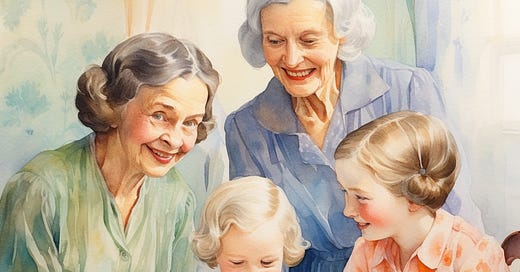In my adulthood, I realized just how incredibly fortunate I had been. As a child, being surrounded by elderly women was natural to me. Living in the same room as my grandmother, visiting her sister who lived just a hundred meters away, or another sister who lived no more than a hundred and fifty meters away, were everyday occurrences for me.
I often found myself bored with the tea served in delicate porcelain cups, the seemingly endless adult conversations, and the slide shows I had to sit through politely. True, the cheese scones and pastries were delicious.
It was also completely natural for me to spend every summer traveling to my grandmother's sister's house, whose grandchild was a very good friend of mine. We spent weeks together in the summer; our grandmothers would take us to the swimming pool, playgrounds, and to get ice cream, which we absolutely loved. Not to mention the incredibly delicious pastries that Aunt Ági baked tirelessly every day. She loved us so much and watched us eat sweets with such joy that her laughter still rings in my ears to this day.
In short, I was surrounded by many elderly women. Less so with men, as I unfortunately never knew my biological grandfathers: one of them died before I was born, and the other disappeared from our lives. However, I was blessed to spend time with at least one step-grandfather. I loved him and his sister very much.
Elderly people, and not just a few, were an integral part of my childhood, and only now have I realized what a special blessing that was. Nowadays, families often scatter to different parts of the world, but even if that doesn't happen, family dynamics are usually different today than they were in my childhood. Unfortunately, I believe today's children lose a lot in this regard.
Back then, during my elementary school years, I had a “memory book.” You know, one of those books with blank pages that one could hand over to those who mattered to them, to write or draw something in. This way, later on, whenever they opened the book, they would be reminded of that person. My book had a silk-like cover with a big red heart and a teddy bear on it. (I've always loved stuffed animals.)
I only had a few friends back then, so my little book filled up rather slowly with drawings and writings. Suddenly, I had an idea and gave the book to my grandmother. It was an obvious choice, considering we lived in the same room…
My grandmother wrote the following quote in it, from the famous Hungarian poet and translator, János Arany, whose Hungarian vocabulary was legendary:
“Noble self-confidence, but not conceit,
Let your soul's springs be stretched for a great feat:
And the greatest aim, here, in earthly existence
Is to be a human always, in every circumstance.”
My grandmother, who had completed only eight grades of primary education, loved literature. She read every day until her eyesight deteriorated so much that she could no longer see properly. Barely having started school, perhaps not even able to read yet, she made me repeat the poem of another favorite poet of hers until I had memorized it entirely. To this day, I can recite it at any moment, even if woken from a deep sleep.
‘If you can hear me, grandma, I thank you! Whenever I recite this poem to myself, I see the image of you sitting by the window in the old armchair, darning socks with your thick glasses on, using your veiny, strong hands, and we recite Attila József's poem “For My Birthday” together. By the way, did you know that I read one or two of his poems every day?’
So, among many other things, my grandmother left me the above quote in my memory book. Although the book itself is lost, I've read the quote so many times that it's engraved in me for life, despite not having thought about it for years after it was first written.
More than ten years after her death, when a colleague came to me and said, “You and your husband are such humane humans," those few lines my grandmother wrote in my memory book came flashing back, and I got teary-eyed. It seems I might not have disappointed her. At least I hope so!
Another important entry in my memory book also came from an elderly woman. It was from my grandmother's nun sister, Mária, who hosted those particular slide shows and tea parties in porcelain cups in her elegant apartment with high ceilings, surrounded by beautiful antique furniture and an always out-of-tune piano. She chose a quote from another famous Hungarian poet, Mihály Babits. This is what she wrote in my memory book:
“In every person's soul, there's a song,
And our very soul echos through every tune
For those with beauty in their soul's refrain,
Hear others' songs as beautiful, not in vain.”
This quote, too, I engraved into my brain, or rather into my heart. Decades later, when I first expressed how much I love and respect genuine human creativity, whether it's about a detail-rich tapestry, an intricate piece of jewelry, a beautifully designed garden, or a precisely executed acrobatic rock and roll, I realized that if I can be so enthusiastic about things others create, then perhaps I've managed to follow her guidance as well.
When we visited Mária for the last time, decades later, just before she passed away at nearly 99 years old, I saw such peace on her face, such tranquility emanating from her entire being, and such love that I will never forget. I am grateful for her guidance and hope that when my time comes, I will leave with exactly the same peace in my heart as she did. Until then, I enjoy the song of my own soul and that of others.
The third poem in my memory book, which became etched in me, was from my step-grandfather's sister, Aunt Buci. I think this was the poem that always gave me hope whenever it turned out again and again that I had landed on the wrong island and found not happiness but tears.
“Row, row on life's endless sea,
But avoid the isle of sorrow, let it be.
Let your strength, unfaltering and true,
Guide you to the shores of joy, where dreams can come true.”
I can't even count how many times I've started over, how many times I've picked myself up from the ground, how many times I've fallen again, to reach where I am today. Although the journey was hard, I am very grateful now that I never gave up. Thanks to her, I never forgot that there must be an island somewhere where my dreams come true, where joy and fulfillment exist.
‘Aunt Buci, I hope you hear me and see that I didn't give up. I believed you because I felt that, after so much pain you endured, you eventually found your own island of happiness, even if it wasn't easy. Thank you for your love.’
Although today I see how fortunate I was to be surrounded by so many old, wise women, to have seen their fingers nimbly moving the sewing needle, to have heard their ringing laughter, to have smelled their pastries as I sat beside them in the kitchen, to have felt the calm emanating from them, to have been shown countless solutions to problems, modes of behavior, formulas of politeness. I absorbed all these things without even noticing.
Yet, these memories, an occasional sentence dropped, a touch, their laughter, the love with which they turned towards me, their understanding and wisdom, how they handled childhood tantrums, left such a deep mark on me that whether I admitted it to myself or not, I always wanted to be like them. To this day, I strive to be as stable, calm, wise, and filled with love as I felt them to be, even if my performance falls short of theirs. But at least I'm trying. At least I know which direction I want to go, at least I know how I want to feel when my time comes to depart. I don't do everything right, because who can do everything right? Even they weren't perfect either. They lived in a world torn by two world wars, shaken by economic crises, and darkened by dictatorship, yet they maintained their humanity, the flame of love burned indestructibly in their hearts, even if some of them showed it less to others. To us children, they did show it. We could warm ourselves by its light, and they passed this flame on to us. We carry it forward in our own hearts, my cousins, my second cousins, and those who met them. This flame guides us on our path, sometimes in the form of little verses written into a memory book, other times as a memory etched within us, laughter that rings in our ears long after their death, or even in the taste of freshly picked peas. (Aunt Ági, I apologize for gobbling up all your peas with my cousin, right there from the plant. No regrets, though, they were divinely delicious and sweet!)
How they were so strong, tough, resilient, yet tender, cheerful, full of love under such difficult circumstances, I have no idea. In any case, they were the guardians of a bygone era, the custodians of real human values and of a world that is fading away. Their magic lay precisely in not compromising on the principles they felt to be true and humane. This was the solid core around which their entire existence was organized. This was what we, the children, could always feel when we were around them, and it gave us a moral compass, to which we try, not always successfully, to remain faithful. Our loyalty to these values is rooted in the love we felt for them as children, when we were less capable of discerning right from wrong and later nurtured by our solidified moral compass. And this is precisely the real magic of elderly people, who are able to keep the flame in their souls, no matter what they have gone through. To show children that it is possible and worthwhile to remain good and humane, for life has a way of balancing the scales, as my mother's favorite French teacher—yet another wise old woman—always said. The good we do is returned in kind, and the ill finds its way back to us, ensuring everyone ultimately reaps what they sow.
– Eszter
Related
Beauty Will Save the World! – Why Was Dostoevsky Right?
Home | Notes | Articles | Eszter’s Magic | Literary Bonbons | Short Stories and Guides | Beyond the Book | EWE Issues | Archive | About






Thank you for sharing this beautifully written, inspiring tribute!